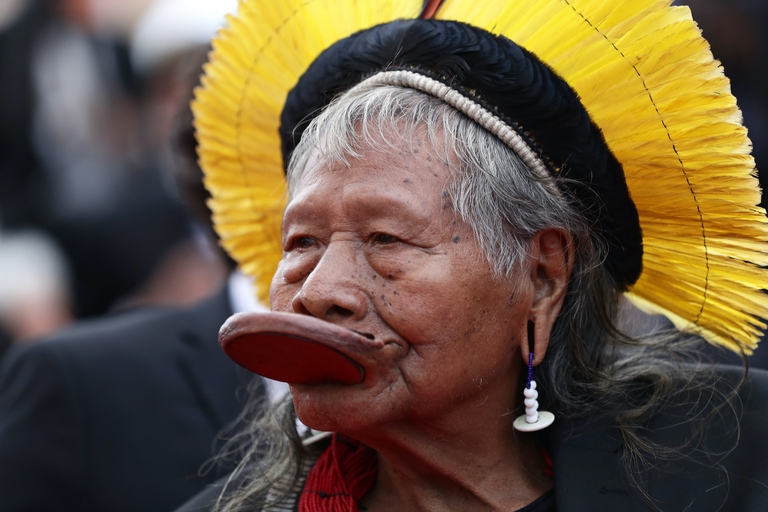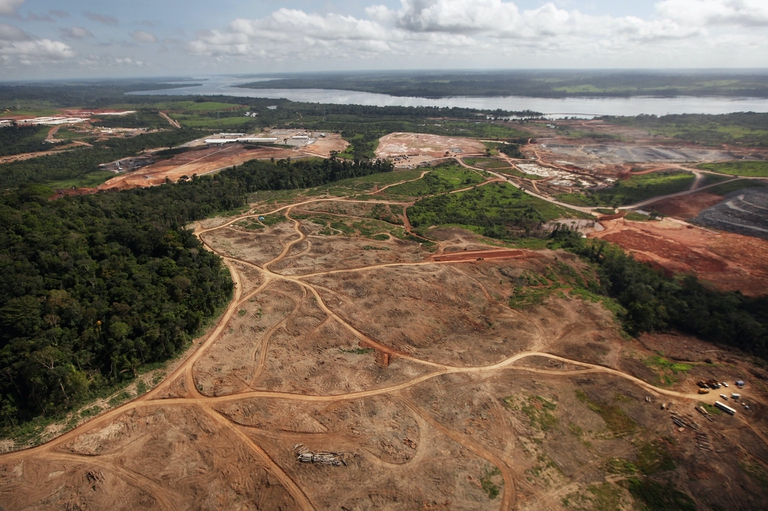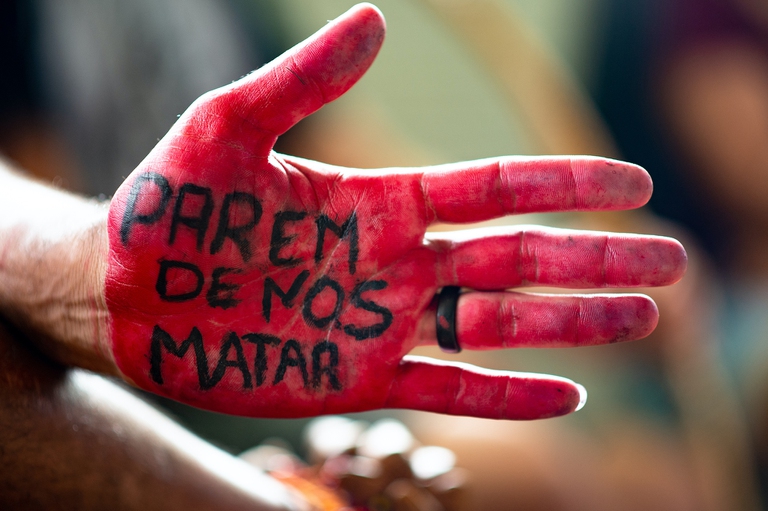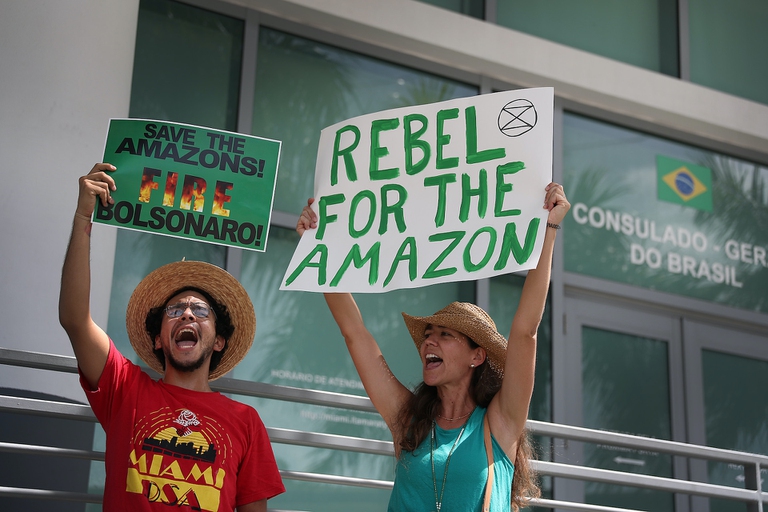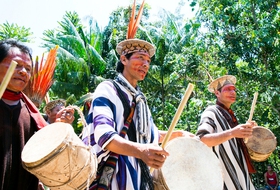
A special report from the Yuqui territory delves deep into the dreams, challenges, joys and sadness of one of Bolivia’s most vulnerable indigenous groups.
Jair Bolsonaro is accused of crimes against humanity for persecuting indigenous Brazilians and destroying the Amazon. We speak to William Bourdon and Charly Salkazanov, the lawyers bringing the case before the ICC.
Almir Narayamoga Suruí is the chief of the Paiter Suruí people and Raoni Metuktire of the Kayapo – tribes that have inhabited the Amazon for time immemorial. The indigenous leaders have come together to present a formal request to the International Criminal Court (ICC), based in the Dutch city of The Hague, to investigate Brazilian president Jair Bolsonaro for committing crimes against humanity, specifically targeting indigenous peoples, within the broader context of environmental crimes.
Throughout his career, Bolsonaro has made no secret of his contempt for Brazil’s native citizens, as a slew of racist and debasing remarks made over the years reveals. During his campaign in the lead-up to the presidential elections of 2018, he did nothing to hide – in fact, he championed – his desire to open up the Amazon to unabated exploitation. Once elected, he wasted no time in converting his words into action: during his first days in office in early 2019, he transferred the responsibility for demarcating native lands from the government’s indigenous affairs agency, Funai, to the ministry of agriculture. In the months and years following, his support for extractive industries in the Amazon, including in territories under indigenous custody, and a climate of impunity favouring illegality have caused alarming rates of deforestation and biodiversity loss and the displacement of Indian communities at the hands of loggers, miners and farmers.
Those standing in the way of this systematic bulldozing have been met with violence and even murder.
Faced with this crisis, Almir Suruí and Chief Raoni, have sought the assistance of William Bourdon, a French lawyer with a long-running career in human rights law. On 22 January, they officially filed a request for preliminary investigation into Bolsonaro’s crimes to the ICC on behalf of the indigenous leaders. “We’ve often represented clients who are victims of environmental crimes,” say Bourdon and lawyer Charly Salkazanov, “and we have a collective duty to protect indigenous peoples,” they told us while explaining the details of this unique case.
What crimes is Bolsonaro accused of?
The charges against Bolsonaro are likely to be qualified as crimes against humanity for his persecution of the indigenous peoples of the Amazon. This includes a number of murders of indigenous leaders and the forced displacement of many people from their lands because of the destruction of the Amazon rainforest and total suppression of the demarcation of aboriginal territories.
You’ve submitted a request for preliminary examination to the ICC. What does this mean?
This legal action takes the form of a communication, which is a term used by the ICC. This communication is filed before the Office of the Prosecutor (an independent organ of the ICC, ed.), which may then decide to open an investigation or submit a request to a pre-trial chamber for authorisation to investigate. The process starts with an investigation first and is usually a long one because the investigation takes time.
When are you expecting to receive a response from the court?
We don’t have a schedule at the moment, but we do expect an investigation to be carried out.
Is Bolsonaro also accused of ecocide?
We’re accusing Bolsonaro of crimes against humanity, but ecocide is a part of this. Our belief that the crimes we denounce could be crimes against humanity is reinforced by Article 7 of the Rome Statute (the treaty underpinning the ICC, ed.), which refers to a “widespread or systematic attack directed against any civilian population”. But these acts were committed in the broader context of environmental crimes, that is to say, the over-exploitation of the country and stealing of natural resources from the Amazon rainforest. In fact, we can identify numerous examples of ecocide, defined as serious and lasting damage to the environment causing significant harm to human life and natural resources, in this case.
Ecocide hasn’t yet been recognised as a crime under international law. What standing does it have?
There’s a movement for the recognition of ecocide in international criminal law. On 15 September 2016, the ICC prosecutor’s office officially announced that one of its priorities for selecting cases is to fight environmental crime. In January 2021, the European Parliament adopted a very important amendment recognising ecocide, including asking for its inclusion in the ICC’s statute. We expect the case against Bolsonaro to open the door for the recognition of ecocide in the context of international law and for the ICC to fight environmental crime. We believe the court understands the gravity of the international environmental emergency, which is why we’re requesting that it investigate Bolsonaro.
What is the background to the case against Bolsonaro? Were you contacted directly by Suruí and Chief Raoni?
Everything started in Bordeaux, in France in 2019 at a workshop organised by a French organisation for the defence of the Amazon, Darwin Climate Coalition. We met representatives of indigenous committees, including Chief Raoni, who spoke of the situation faced by his community, Bolsonaro’s criminal policy and judicial impasse in Brazil. On Raoni’s request, we presented the conditions for bringing the case to the ICC. From then, we undertook a great effort to write the report, thanks also to the help of the Darwin Climate Coalition and an international team of NGOs and jurists, which is the communication that was filed to the ICC. Our gratitude is great because without those who helped us this action wouldn’t have been possible.
How was the report compiled?
It was a huge undertaking that took over a year. We did our best to achieve the most complete communication possible: the document is more than 60 pages long with a lot of research, sources and information, all carefully verified. We went as far as to look at the elements of Bolsonaro’s language when he was still a presidential candidate to attest the premeditation of his policy of predation against indigenous Brazilians. We were able to find evidence of Bolsonaro’s will to destroy indigenous people, including through murder, forced transfers and persecution.
Everything is well documented: we have the testimony of indigenous witnesses, including victims, who gave direct evidence, we have the numbers and names of those murdered and the communities forced to migrate because of the predation of industries acting in complete freedom as a result of Bolsonaro’s policies. We also have elements that prove persecution, such as how the agencies responsible for indigenous affairs and demarcating aboriginal lands were restructured; left without a budget and put under the command of military figures.
If the ICC investigates the case, what powers would it have?
During the course of an investigation the prosecutor’s office has diversified and broad powers, including finding and examining evidence, questioning victims and witnesses. It can also request assistance and cooperation from states and international organisations as well as send investigators to areas where the alleged crimes have occurred to gather evidence.
Would the government led by Bolsonaro recognise its jurisdiction?
Brazil’s constitution recognises the ICC. In addition, Article 1 and 17 of the Rome Statute establish that the ICC has subsidiary jurisdiction to a national court when the latter refuses or isn’t able to prosecute or judge. In our case, the principle of subsidiarity is satisfied. Of course, Bolsonaro has huge power in the country, which is why we’ve had to bring this legal action to the ICC. We also have a lot of documentation showing the incapacity or lack of will on the part of the Brazilian judicial authority to investigate or judge those responsible for the predation and persecution of indigenous peoples. The ICC has already faced this kind of situation – in which a political authority holds all power and obstructs justice – so it wouldn’t be the first time.
Have you spoken directly to Suruí and Chief Raoni?
There have been direct discussions with Chief Raoni which have been intense and emotional. In them, Raoni expressed sadness as well as the desire to take action to improve his people’s conditions. Working on this case is a huge responsibility and an honour for us. We know Almir Suruí and Chief Raoni aren’t acting for their own sake, but because the Amazon and humanity need it. They feel it’s their duty to protect all indigenous peoples.
Siamo anche su WhatsApp. Segui il canale ufficiale LifeGate per restare aggiornata, aggiornato sulle ultime notizie e sulle nostre attività.
![]()
Quest'opera è distribuita con Licenza Creative Commons Attribuzione - Non commerciale - Non opere derivate 4.0 Internazionale.
A special report from the Yuqui territory delves deep into the dreams, challenges, joys and sadness of one of Bolivia’s most vulnerable indigenous groups.
The Yuqui people of the Bolivian Amazon fight not only to survive in the face of settlers, logging and Covid-19, but to preserve their culture and identity.
Activists hail the decision not to hold the 2023 World Anthropology Congress at a controversial Indian school for tribal children as originally planned.
Autumn Peltier is a water defender who began her fight for indigenous Canadians’ right to clean drinking water when she was only eight years old.
The pandemic threatens some of the world’s most endangered indigenous peoples, such as the Great Andamanese of the Andaman and Nicobar Islands in India.
The Upopoy National Ainu Museum has finally opened. With it the indigenous people of Hokkaido are gaining recognition but not access to fundamental rights.
A video shows the violent arrest of indigenous Chief Allan Adam, who was beaten by two Royal Canadian Mounted Police (RCMP) officers.
On top of a 2.4 million dollar compensation, the indigenous Ashaninka people will receive an official apology from the companies who deforested their lands in the 1980s.
